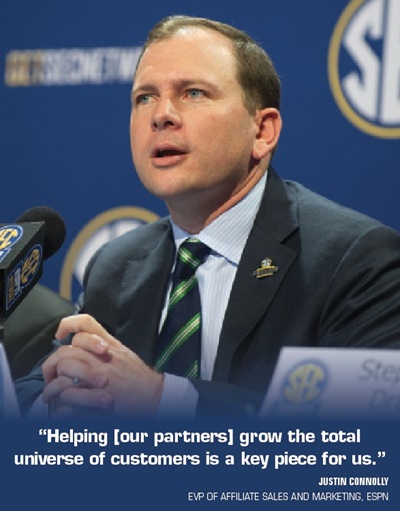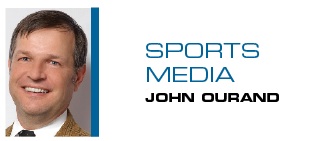There’s been a lot of upheaval this year in
ESPN’s affiliate sales department, the group responsible for bringing in most of the company’s revenue. ESPN’s affiliate group lost its top two executives — and decades of institutional knowledge — when
Sean Bratches and
David Preschlack announced their resignations earlier this year.
Last month, ESPN posted its lowest subscriber count since February 2007. The network is in 92.94 million homes, according to Nielsen — a number that’s down more than 7 million homes since its high of 100.18 million homes in May 2011.
Plus, ESPN is in the middle of a lawsuit with Verizon, which started marketing low-cost packages that don’t include the high-priced sports networks.
Even though almost all of ESPN’s cable affiliate deals are in the midst of long-term contracts, everywhere you turn, it seems like new threats are popping up with the potential to undermine its business.
Justin Connolly is the executive ESPN picked to lead the company through those threats. Connolly has the reputation in Bristol as a high flyer — he’s someone insiders always point to as the executive most likely to run ESPN once company President John Skipper decides to step down.
 |
Photo by: RICHARD DUCREE / ESPN IMAGES
|
The Harvard-educated Connolly got his start in the affiliate business in 2003, but he left the group a little more than a year ago to move to North Carolina and oversee the
SEC Network’s successful launch. Now, Skipper has called him back to be the steady hand guiding the affiliate group through this state of unrest.
“For some, they would look at it and suggest that the move is crazy,” Connolly said. “But I actually look at it and think there are some incredible challenges and opportunities ahead. There’s not a better-positioned programming group than the Walt Disney Co.”
In his first interview since taking over as executive vice president of affiliate sales and marketing, Connolly spoke about how he plans to address some of the challenges ahead in his new role.
■ What’s the biggest issue you face in your new role?
CONNOLLY: Competition and consumer affordability around pay TV are big questions for us. Having the right conversations and dialogue with our existing partners and helping them grow the total universe of customers is a key piece for us. That’s the biggest challenge we’re facing: How do we keep as many people in the overall content ecosystem as possible?
■ But with over-the-top networks and digital offerings, it seems impossible for the existing cable and satellite operators to grow.
CONNOLLY: When I think back when I started, neither Verizon nor AT&T U-verse had launched. I was a part of the team that negotiated with those guys before they even got into the business. They added more competition to the MVPD (multichannel video programming distributor) universe. Now, the focus is on whether there are other ways to get content out to consumers and how should we participate with that.
I want to stop short of a prediction. But I do think that we are trying to figure out whether there is an opportunity to make the content availability business go through another renaissance here through the consumer choices and the technologies that exist. Can we deliver really great high-quality content to consumers in ways that are different from the past? We’re starting to experiment. The question is what does that look like 24, 36, 48 months from now.
■ What do you mean?
CONNOLLY: You have our traditional multichannel distributors — the Comcasts of the world — that are going through continued consolidation, looking to get more scale. You’ve got other players like Netflix, Google, which are interesting, particularly as it relates to entertainment-based content from the Walt Disney Co. We have an ownership stake in Hulu, and Netflix is a partner of ours that syndicates our content. Then you’ve got a whole wave of other people with whom we’ve done deals, like Sling TV. We’ve had conversations with Sony. That mix is always changing. We are in conversations with everybody all the time about how we take what is the best portfolio of content in the industry and make it available in a thoughtful way to consumers.
■ Was it difficult to leave the SEC Network after only one year?
CONNOLLY: I don’t want to call it an easy decision. But it seemed like a natural growth opportunity to basically come back to the group in which I started at ESPN in the early 2000s. It is a good time for a transition. I loved the experience of being in on the ground floor, negotiating with the SEC, working through all the hurdles of our Watch app. At the same time, there’s still a lot of work to do there. Year one would probably be the most important year. But I think year two is critically important as well in terms of sustaining the momentum and growing the brand; getting more integrated with the schools. Roz Durant (ESPN’s senior vice president of college networks, programming) is going to do a killer job on that.
John Ourand can be reached at jourand@sportsbusinessjournal.com. Follow him on Twitter @Ourand_SBJ.





